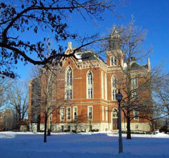|
French
Descriptions
and sample syllabi from some of my upper-level French courses:
-
French Conversation & Phonetics
This course emphasizes conversation practice, vocabulary
expansion, and the study of phonetics to improve pronunciation and
intonation. Class discussion, poetry readings, review of certain
grammar points, and French composition are also included. Students
can earn an "S" competency in this class by presenting
an oral exposé (en français).

-
Business
French
This
course is designed for those students interested in international
business or who intend to work professionally in French-speaking
countries. Particular attention is given to the many technical,
cultural, and practical aspects of the francophone business world--from
banking, the stock market, and advertising to writing a French CV
and managing various kinds of business correspondence.

-
French
Topics - La Chanson française
First
offered in the spring of 2004, this course examines the evolution
of French popular music and songwriters from the post-Second World
War era (Piaf, Trenet, et al.) to the present (Indochine, Zazie,
et al.). Studied as a form of oral literature, the lyrics of these
songs reflect both the values of their time as well as the timeless
themes of love, death, prejudice, exoticism, patriotism, etc.

- French
Topics - Le
Fantastique et la SF
Taught for the first time in the fall of 2005, this course focuses
on two of the most popular genres of speculative fiction in France:
le "fantastique" (horror) and la science-fiction (SF). For
the former, we study short stories by authors such as Gautier, Mérimée,
and Maupassant; for the latter, we study novels by Verne, Rosny, Barjavel,
and Boulle.

-
French
Seminar - L'Amour et la Mort
The
most advanced course offered in French (and required of all senior
French majors), the French Seminar's topic changes each year. Offered
in the spring of 2002 and 2006, I focused on the dual themes of
love and death in French literature from the Middle Ages to the
20th century in authors such as Marie de France, Ronsard, Racine,
Prévost, Balzac, Cocteau, Beauvoir, and Duras. In 2008,

Science
Fiction
Descriptions
and syllabi from my courses on science fiction:
- First-Year
Seminar
In
this Frosh survey course, students examine representative SF stories
from a variety of historical periods--from "space opera"
and futuristic utopias to women-only worlds and cyberpunk. Short movie
clips accompany most of the readings. Highly interdisciplinary and
thematic in nature, this course focuses on topics such as global apocalypse,
genetics and biotechnology, alien encounters, robots and cyborgs,
computers, virtual reality, and time travel, among others.
- Honor
Scholar Seminar
As a literature of speculation and "thought experiment,"
SF has a long tradition of raising fundamental questions about how
we define ourselves, our reality, and our possible futures. Through
a selection of readings from Jules Verne to post-cyberpunk, this course
addresses a variety of recurring philosophical and social themes in
SF--technology and human values, gender and identity, alienation and
the "other," cybernetics and artificial intelligence, etc.--and
how they reflect certain evolutionary currents in today's world and
(perhaps) the world of tomorrow.

French Lit.
course
in English
Description
and syllabus from my course on French literature:
- French
Lit. in Translation: Love and Death
Adapted
from my French course that focused on the same topic, this course
examines the complex relationship between love and death (both literal
and metaphorical) in several works of French literature from the Middle
Ages to the present. All primary readings are in English translation,
and the class is conducted exclusively in English. A few of the authors
in this course include: Marie de France, Ronsard, Racine, Constant,
Mérimée, Gautier, Flaubert, Zola, Maupassant, Cocteau,
and de Beauvoir.

|


